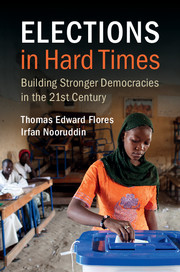Book contents
- Frontmatter
- Dedication
- Epigraph
- Contents
- List of figures
- List of tables
- Preface
- Part I From Elections to Democracy: Theory and Evidence
- Part II Challenges Facing Elections in Developing Countries
- 4 The Ephemeral Power of Contingent Legitimacy
- 5 Experience Matters: Democratic Stock and Elections
- 6 Starved States: Fiscal Space and Elections
- 7 Violent Votes: Conflict and Elections
- Part III Democracy Promotion for the Twenty-first Century
- Appendix A Data Appendix: Sample, Variables, Sources
- Appendix B Main Statistical Results
- Notes
- Bibliography
- Index
4 - The Ephemeral Power of Contingent Legitimacy
from Part II - Challenges Facing Elections in Developing Countries
Published online by Cambridge University Press: 05 September 2016
- Frontmatter
- Dedication
- Epigraph
- Contents
- List of figures
- List of tables
- Preface
- Part I From Elections to Democracy: Theory and Evidence
- Part II Challenges Facing Elections in Developing Countries
- 4 The Ephemeral Power of Contingent Legitimacy
- 5 Experience Matters: Democratic Stock and Elections
- 6 Starved States: Fiscal Space and Elections
- 7 Violent Votes: Conflict and Elections
- Part III Democracy Promotion for the Twenty-first Century
- Appendix A Data Appendix: Sample, Variables, Sources
- Appendix B Main Statistical Results
- Notes
- Bibliography
- Index
Summary
The promise of elections is that they confer on the chosen a legitimacy that is denied to those who acquire power by other means. Short of a handful of states that still permit some form of hereditary rule, all modern states now use elections as the primary means of choosing rulers. The hope of democracy promoters is that legitimate elections will further consolidation in more experienced countries and jump-start transitions in nascent democracies. As we have seen, an influential literature argues that democratization by elections is a modern mode of democratic transition.
A primary question therefore is whether elections generate a positive democratic dividend in the developing world. Our answer is that they do, sometimes; yet, even when elections do generate a store of legitimacy for the victor, that legitimacy has an expiration date. We call this “contingent legitimacy” to emphasize the point that while elected leaders enjoy a governance advantage over their non-elected counterparts, they do so only temporarily. At some point, their democratic halo dissipates and they must perform and meet their citizens’ lofty expectations or risk squandering their honeymoon period. The length of this post-election honeymoon period varies across countries because elections themselves differ in the contingent legitimacy they confer on their winners.
Over the past two decades, academic research has confirmed what journalists and civil society activists have long known – that many of the elections held across the developing world since the end of the Cold War were at best dubious in their commitment to the best practices for protecting electoral integrity. While some countries took great pains to ensure their elections met internationally promulgated standards and subjected their processes to external monitoring, many did not. Too many elections resembled instead the sham exercises conducted in Ethiopia in 2015, where the ruling party won all the seats in an overwhelming show of dominance secured by harassing opposition figures and suppressing independent civil society.1 Common sense tells us that elections such as that of Ethiopia in 2015 will do little to further the cause of democracy in that country. By contrast, the same intuition tells us that clean elections should yield a greater store of contingent legitimacy, opening a larger window of opportunity for democratic change. And therefore cleaner elections should yield a greater democratic dividend, all else equal.
- Type
- Chapter
- Information
- Elections in Hard TimesBuilding Stronger Democracies in the 21st Century, pp. 81 - 95Publisher: Cambridge University PressPrint publication year: 2016



